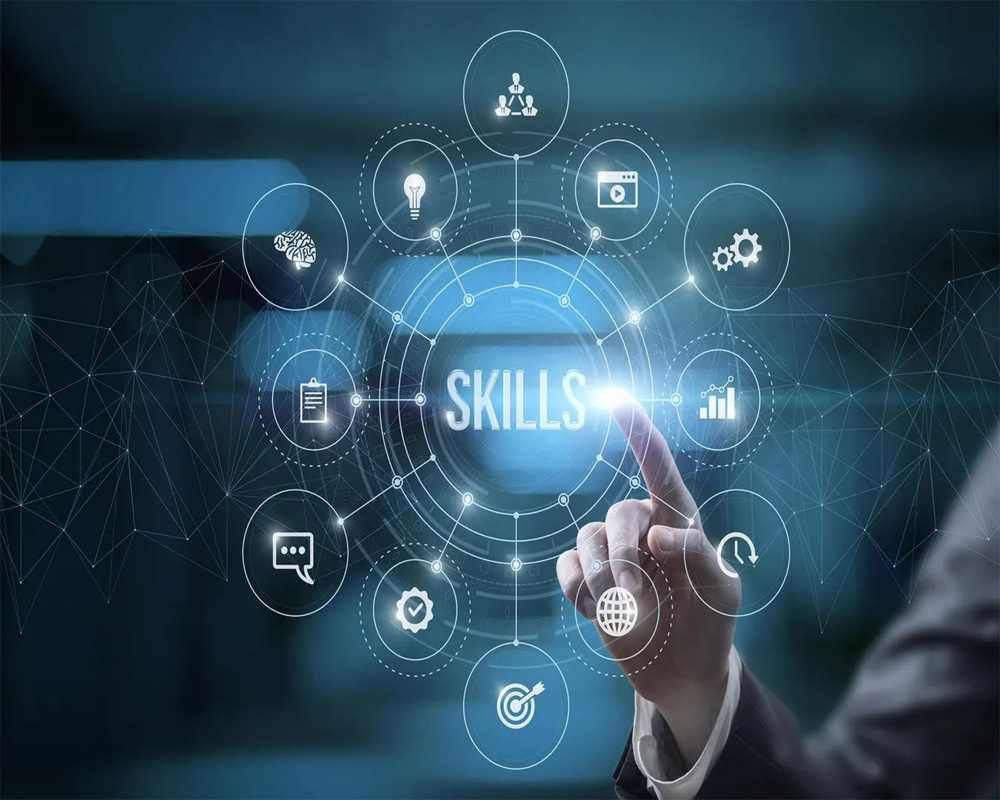The future belongs to those who embrace continuous learning, adapt to emerging trends and cultivate a blend of technical and soft skills
The rapidly evolving global landscape of the job market presents exciting opportunities and formidable challenges. With technological advancements reshaping industries and global hiring trends influenced by economic shifts, the most valuable asset for professionals will be their skills. Understanding market demands and proactively adapting will be crucial for those considering a career transition.
The Demand for Skills in a Rapidly Evolving Market
According to the World Economic Forum’s Future of Jobs 2023 report, the most demanded skills by 2027 will include artificial intelligence (AI), enormous data competency, creative and analytical thinking, leadership, social influence, and continuous learning. However, only 50 per cent of employees today have access to adequate learning opportunities and six out of ten will need upskilling within the next few years.
This widening skills gap presents both a challenge and an opportunity for professionals to invest in their development and distinguish themselves in a competitive job market. Businesses, too, are grappling with the rapid pace of technological change. By 2027, nearly 44 per cent of workers’ core skills will be impacted, creating an urgent need for companies and employees to embrace continuous learning. Those who adapt swiftly will find themselves in high-growth sectors with ample career opportunities.
Bridging the Skills Gap
By 2025, an estimated 97 million new jobs will be created globally, driven by AI, the Internet of Things (IoT), and robotics. Yet, many of these positions may remain unfilled due to a shortage of skilled professionals. In India, AI adoption has already reached 48 per cent across industries, with banking and financial services leading at 68 per cent, followed by technology at 60-65 per cent. However, the lack of qualified talent threatens to slow this progress.
India produces 1.5 million engineering graduates annually, yet only 45 per cent meet industry standards, and just 10 per cent secure jobs, according to Team Lease Digital. The challenge extends beyond technical expertise—employers are also looking for strong communication, problem-solving, and teamwork skills, often overlooked in traditional education.
The Changing Nature of Work
The rise of automation, AI, and robotics is shifting job requirements. The McKinsey Global Institute highlights that social, emotional, and higher cognitive abilities are becoming more critical while manual and basic cognitive skills are declining.
For example, cyber security is experiencing an unprecedented demand, with 3.5 million positions currently unfilled across technology, telecom, and manufacturing. These roles require technical expertise, strategic thinking, and leadership capabilities.Similarly, industries such as 5G equipment manufacturing, climate technology, and renewable energy are booming. Professionals with hybrid skill sets—combining technical knowledge with business acumen—are increasingly sought after.
The Education System’s Role in Workforce Readiness
To meet the demands of Industry 4.0, education must evolve. Despite India’s extensive network of over 40,000 institutions and nearly 1,000 universities, there remains a disconnect between academic learning and industry requirements. According to NASSCOM, India’s technology sector will need over one million engineers with AI and emerging technology expertise within 2-3 years. However, the digital skills gap will increase from 25 per cent to 30 per cent by 2028, underscoring the urgency for a job-ready workforce.
Closing the Gap Through Collaboration
A key solution lies in stronger collaboration between universities and online learning platforms. Real-world, industry-aligned education can significantly enhance employability. A recent Hire-Pro report revealed a stark disconnect in perception: while 70 per cent of colleges believe their graduates are job-ready, only 16 per cent of employers agree. With Gen Z set to make up 27 per cent of the global workforce by 2025, bridging this gap is critical.
The Role of Technology in Job Creation
The digital revolution continues to transform industries. Cloud computing, AI, and machine learning are driving innovation, with 59 per cent of IT professionals in large companies having already deployed AI solutions, according to the IBM Global AI Adoption Index 2023. By 2026, India’s IT sector alone is projected to contribute $350 billion to the GDP. However, workforce readiness remains challenging, highlighting the need for urgent action to close the skills gap.
The Power of Continuous Learning
Success in today’s workplace is no longer defined solely by a degree. Employers increasingly prioritise skills over formal education, making continuous learning essential for career advancement. Upskilling through workshops, online courses, and certifications is now a necessity rather than an option. Many companies partner with e-learning platforms to provide tailored training programmes, ensuring employees acquire technical and soft skills. This investment in learning and development benefits individuals and strengthens businesses in the long run.
The Growing Value of Soft Skills
While technical expertise is critical, soft skills such as problem-solving, communication, and adaptability are equally valuable. In a dynamic and fast-changing work environment, professionals with strong interpersonal skills will have a competitive edge, enabling them to lead teams, collaborate effectively, and manage complex projects.
The Future: Adaptability is Key
The workforce of the future will belong to those who embrace skill development and lifelong learning. Whether you’re a fresh graduate or an experienced professional, adaptability will be the key to long-term success. Educational institutions and online platforms must work together to equip professionals with the right mix of technical and interpersonal skills. In a world where change is the only constant, staying ahead requires a commitment to growth and a willingness to evolve with the times.
(The writer is a Co-Founder and MD of Orane International, a Training Partner with the National Skill Development Corporation (NSDC), and a Network Member, of India International Skill Centres, an initiative of GoI; view express are personal)
























